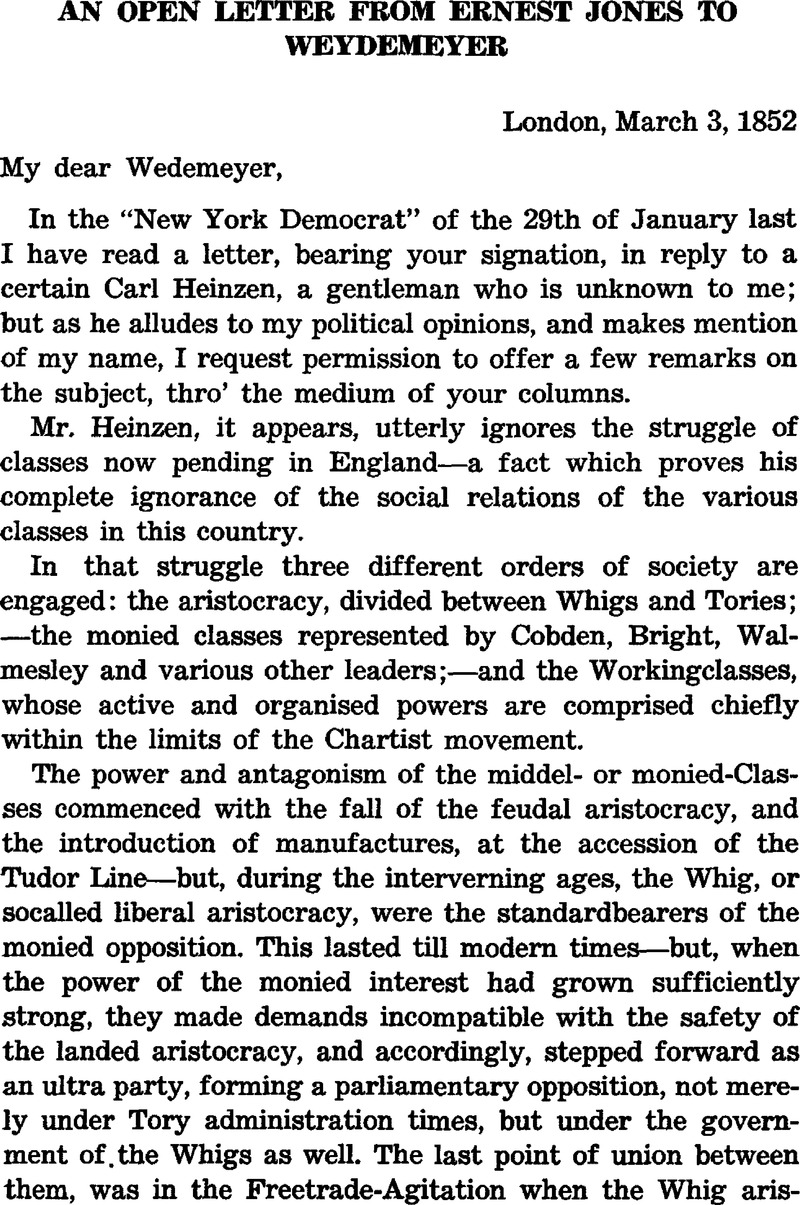Published online by Cambridge University Press: 18 December 2008

page 182 note 1) The words between [ ] have been corrected by Jones.
page 183 note 1) It seems never to have been published; Marx urgently pressed Weydemeyer for doing so In his letter of March 25, 1852.
page 184 note 1) The passages in the ‘Deutsche Brüsseler Zeitung’ are mentioned in: Hans, Huber, Karl Heinzen (1809–1880), 1932, p. 56–63 (notes).Google Scholar
page 184 note 2) “You would put the accent of the time on social questions and you fail to realize that there is no social question more important than that concerning Monarchy and Republic”\\ “that with the despatch of the social question of Monarchy and Republic not a single social question should be solved yet in accordance with the wishes of the proletariat” Huber, resp. p. 59 and 60.
page 184 note 3) Cf., John Saville, Ernest, Jones: Chartist, 1952 (p. 27), who states that they must have met in Paris as early as March 1848, and quotes (p. 40) a letter from Engels to Marx of March 18th 1852 in which it is said of Jones: we may well say that he would not have got on the right road without our teaching (“und wir können wohl sagen, dass er ohne unsre Doktrin nicht auf den richtigen Weg geraten wäre”, Marx-Engels-Gesamtausgabe, 1929 III, 1, p. 331).Google Scholar
page 185 note 1) It is worth noting that Jones here uses the term “workers” aristocracy', which was to become so frequently used in later times.
page 186 note 1) Notes to the People, p. 995, col. 1.
page 187 note 1) The first edition of “Der 18e Brumaire des Louis Bonaparte” was edited by W.
page 187 note 2) Franz, Mehring, Neue Beiträge zur Biographie von Karl Marx und Friedrich Engels in: Die Neue Zeit, XXV, 1 (1907), p. 162.Google Scholar
page 187 note 3) This at least is the paper of Heinzen's appearing at the time (cf., Huber, p. 105). The instructions from Marx to Weydemeyer also advise against a publication in the Janus.Google Scholar
page 187 note 4) “At the same time coarse and subtle, and this combination forms part of a polemic worthy of the name”. Mehring, Neue Zeit XXV, 3, p. 163.Google Scholar
page 187 note 5) Karl, Marx, Chronik seines Lebens in Einzeldaten 1934, p. 119.Google Scholar
page 188 note 1) Mehring, pp. 163–165. The complete text is printed in the Russian “Collected edition”, XXV, p. 143.Google Scholar That Marx was for the rest satisfied with Jones' letter appears from his letter to Engels, dd 3rd March 1852. Of Jones' letter he says ‖ “worin er Heinzen avec un dédain suprême behandelt und ihn über den „war of classes” belehrt” (‖ in which he treats Heinzen ‘avec un déldain suprême” and gives him a lesson on the war of classes. [, M.E.G.A. III, 1, p. 329].Google Scholar
page 188 note 2) Marx' letter is dated 5th March, the deleted line stated “March 3rd”.
page 188 note 3) Cf., Karl Marx, Chronik seines Lebens in Einzeldaten, 1934, p. 120, sub 03 5th 1852.Google Scholar
page 189 note 1) The translation as well as the letter of Jones, is in the MarxEngels Archives in the I.I.S.H.
page 189 note 2) Mehring, , p. 165.Google Scholar